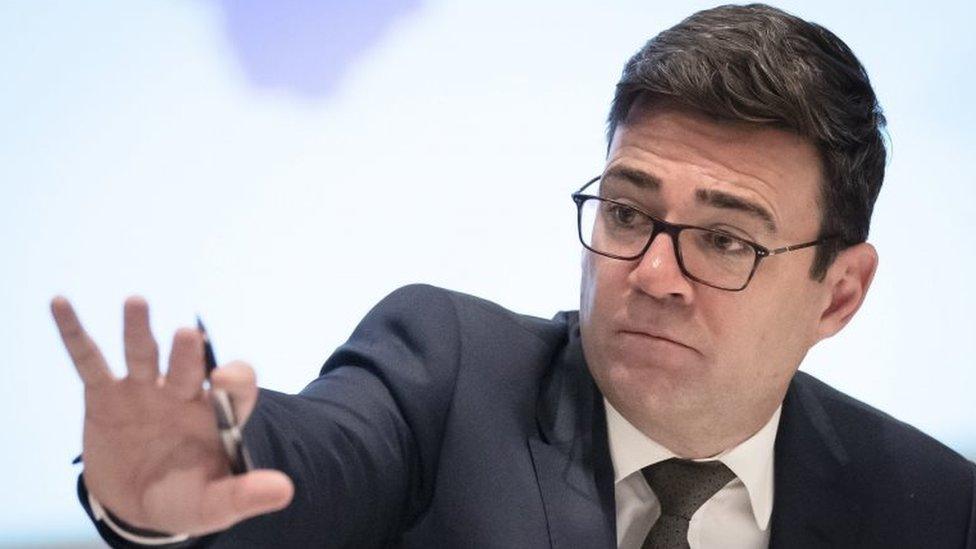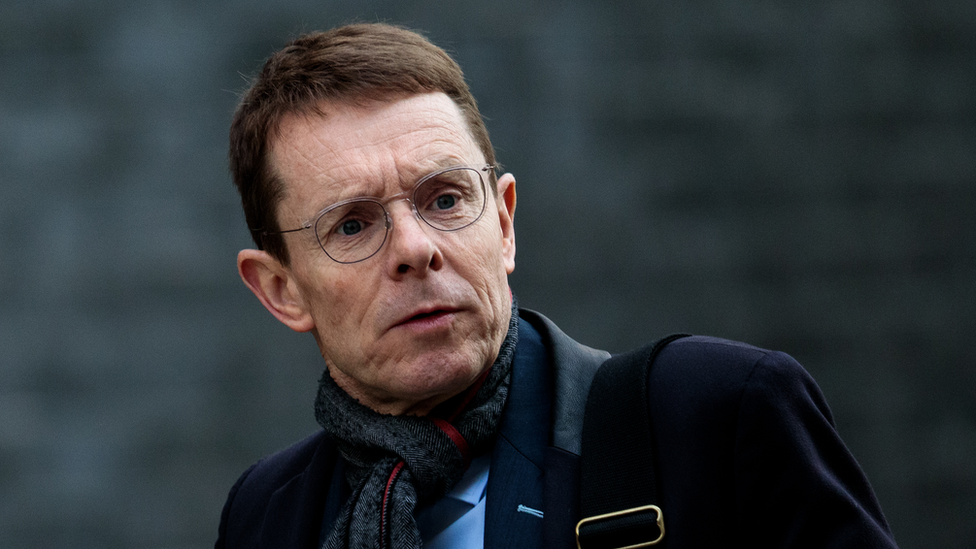Coronavirus: Andy Burnham warns PM risks 'fracturing national unity'
- Published

Andy Burnham warned there could be a second spike of coronavirus cases in the north
Greater Manchester mayor Andy Burnham says Boris Johnson faces a "fracturing of national unity" if he ignores the regions in the coronavirus outbreak.
Mr Burnham said mayors had not been told the lockdown was being eased.
Writing in the Observer, external, he warned that without extra support for the English regions, there was a danger of a "second spike" of the disease.
His intervention came as the prime minister accepted that there had been "frustration" over lockdown rules.
The devolved administrations in Scotland, Wales, and Northern Ireland have refused to follow Mr Johnson's easing plan, while cities such as Liverpool have said they will not start re-opening schools on 1 June as the government wants.

Liverpool, Gateshead and Hartlepool are adopting their own approaches on reopening schools
The infection rate - also known the reproduction or R number - is higher in northwest England than London.
Speaking to BBC Breakfast, Mr Burnham said: "It's the most deprived councils that have seen the highest number of cases."
While coronavirus cases have been declining in the South East, Mr Burnham believes the loosening of restrictions "came a little early" for the North.
"There is a very different picture in the north, particularly in the North East where the R number is highest, external, so I understand why people have concerns there."

Mr Burnham said West Midlands mayor Andy Street should be on the government's Cobra committee
Despite having taken part in a call two weeks ago with Mr Johnson and eight other regional mayors, Mr Burnham said he was given no real notice of the easing in restrictions, which was announced last Sunday.
"On the eve of a new working week, the PM was on TV 'actively encouraging' a return to work.
"Even though that would clearly put more cars on roads and people on trams, no-one in government thought it important to tell the cities that would have to cope with that," he said.
To prevent further divisions, he urged Mr Johnson to appoint West Midlands mayor Andy Street to represent the English regions on the government's Cobra civil contingencies committee.
"If the government carries on in the same vein, expect to see an even greater fracturing of national unity. Different places will adopt their own messaging and policies," he said.
"Nervousness in the North"
Mr Burnham added that the prime minister "hasn't given us a transport funding deal like in London so we can put on extra trams and buses to keep people safe."
A government spokesperson said they would "continue to work closely" with councils.
"The suggestion that we have chosen to favour certain councils over others is entirely wrong."
However Mr Burnham challenged the government's claim that an allocation of an extra £3.2bn to English councils had been "distributed in the fairest way".
He called for the government to "acknowledge that councils need extra funding" and to publish regional R numbers, which would help local authorities decide when to reopen schools.
"People do not have the R information at the moment. They can get it, but it's not formally published by the government."
In the Observer, he wrote: "Nervousness in the North about the R number will see more councils adopt their own approach on schools, as Liverpool, Gateshead and Hartlepool are doing. Arguments will increase about funding.
"And if we don't get the help we need, there is a risk of a second spike here which, in turn, will pass the infection back down the country through the Midlands to London."

RISK AT WORK: How exposed is your job?
SCHOOLS: When will children be returning?
EXERCISE: What are the guidelines on getting out?
THE R NUMBER: What it means and why it matters
LOOK-UP TOOL: How many cases in your area?

The prime minister wrote in the Mail on Sunday, external that more complicated messages were needed during the next phase of the response and as restrictions changed.
In his article, Mr Johnson said changes to lockdown restrictions in England - such as unlimited exercise outdoors - were possible due to the public's "good common sense".
In a reference to confusion and criticism of the government's new message urging people to "stay alert", Mr Johnson said the government was attempting something that has "never had to be done before".
- Published24 April 2020
